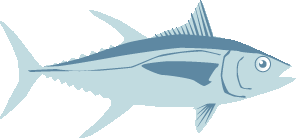Overview
The multi-species longline fishery targeting highly migratory large pelagic species as tuna, swordfish and mahi mahi, is of crucial environmental, social and economic importance in Costa Rica for coastal livelihoods and the processing and export industries. It is the most relevant seafood sector in the country for the international markets; specifically, the US, which imports 80% of the landed volume. Additionally, domestic consumption of these three species has increased recently. Costa Rican commercial fleet mainly uses surface longline as fishing gear and complementary a fiberglass pole is carrying on for green stick fishing. Approximately, 350 vessels are registered (please, visit full list is in Memorandum of Understanding section), ranging from 12 m to 25 m in length, denominated medium and advance. The main Pacific fishing communities for these species are Cuajiniquil, Puntarenas, Quepos and Golfito. This is a national FIP that encompasses the total medium and advance-type longline vessels fishing in the Pacific Ocean.
Several species of tunas, billfishes and sharks, among others, are primary and secondary species, and olive ridley sea turtle (Lepidochelys olivacea) is the most abundance endangered, threatened and protected species (ETP) of this fishery.
INCOPESCA is the institution that manages, regulates and promotes the development of the fishing and aquaculture sector with an ecosystem approach, under the principles of sustainability, social responsibility and competitiveness. The National Coast Guard System (SNG) is responsible for monitoring and surveillance at sea.
The main regulation instrument is the Fisheries and Aquaculture Law No. 8436 of 2005 and its Norm. INCOPESCA's highest institutional authority is the Board of Directors (Law 7384, the law creating the Costa Rican Institute of Fisheries and Aquaculture) and its purpose is to direct and establish institutional policies for compliance with the laws governing the country's fisheries and aquaculture. Executive Decree No. 38681 MAG-MINAE for the management of tuna and tuna-like species in the Exclusive Economic Zone of the Costa Rican Pacific Ocean establishes zoning and regulation for these species. The National Fisheries and Aquaculture Development Plan guides this sector.
Costa Rica is a member of the Organization of the Fisheries and Aquaculture Sector of the Central American Isthmus (OSPESCA), the Inter-American Tropical Tuna Commission (CIAT) and the Inter-American Convention on the Protection and Conservation of Sea Turtles (IAC), which establishes binding resolutions and conservation measures in the country.
To improve the sustainability performance of this fishery, an alliance between Costa Rican Fishery and Aquaculture Institute (INCOPESCA), Ministry of Agriculture and Livestock (MAG), producers, exporters, a group of US supply chain actors, and United Nation Development Program (UNDP) along with fisheries in Costa Rica have come together to start a Fishery Improvement Project. FIP will be led in country and receive support from market chain actors.
Lead FIP participants from Costa Rica are organized under a FIP working group included in the National Sustainable Fishery Platform for Large Pelagic, a multi-stakeholder dialogue forum facilitated by UNDP and participated by all national stakeholders linked to the large pelagic fisheries in country. The National FIP working group that will lead implementation of the project is composed by:
- Costa Rican Fishery and Aquaculture Institute (INCOPESCA)
- Ministry of Agriculture and Livestock (MAG)
- National Longline Fishing Sector: Cámara Nacional de la Industria Palangrera (CNIP); Cámara de pescadores artesanales de Puntarenas (CAPAP); Cámara de pescadores de Quepos; Cámara de pescadores de Guanacaste; Cámara de pescadores de Golfito; CAMAPUN; UNIPESCA.
- Exporters Association- CANEPP Cámara Nacional de Exportadores de Productos Pesqueros y Acuícolas (CANEPP)
- MARTEC
- FRUMAR
- UNDP
Participants from the Supply Chain have organized under a Market Support Group. As such, US participants in the FIP, provide assistance to the project through financial support arising from a percentage of the sales. Market Support Group is formed by:
- Chefs Trading
- Trinity Seafood
- Seattle Fish Company
- Frequentz
The National Sustainable Fishery Platform for Large Pelagic is an initiative framed within the UNDP’s International Green Commodities Programme and the Global Sustainable Supply Chains for Marine Commodities, a joint programme implemented by UNDP and the Sustainable Fisheries Partnership (SFP), who has provided support and technical advice during FIP development.
The multi-species longline fishery targeting highly migratory large pelagic species as tuna, swordfish and mahi mahi, is of crucial environmental, social and economic importance in Costa Rica for coastal livelihoods and the processing and export i
The main objective of the FIP is making the fishery sustainable according to Marine Stewardship Council Fisheries Standard and aligned with Sustainable Development Goals by November 2025
By 2025, this FIP aims to:
- Define biological unit for mahi in the EPO and conducted the stock assessment.
- Establish harvest control rules and strategy for mahi and swordfish in the EPO.
- Improve data collection, monitoring and analysis of target, secondary and ETP species in the fishery.
- Recognize traditional and local ecosystem knowledge and women's roles in the research, management and decision making of the fishery.
- Mitigate environmental impact of longline and green stick fleet on the fishery.
- Achieve an effective management by a participatory plan for the fishery agreed with all stakeholders.
- Position the Costa Rican responsible fishing product from the FIP on the international and national market.



